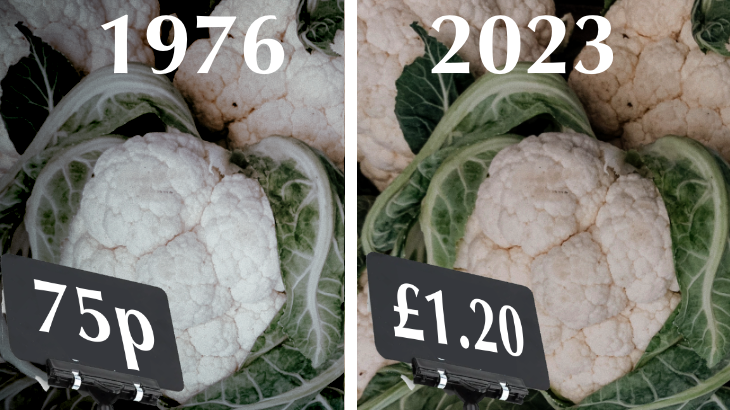Are Supermarkets Paying Fair Prices to Growers?

This morning (13/11/23) on BBC Farming Today1, a grower of cauliflowers pointed out that in 1976 when he left school the price was 75p each; today he is selling caulis at £1.20. In ’76 his first new tractor was £9,500; today a new tractor is £150,000. “Supermarkets use vegetables as a loss-leader to get people in”, he complained.
A new survey2 by British Berry Growers reported in The Fruit Trades Journal on 10th November has found that 80% of British berry growers feel they no longer have partnership relationships with UK supermarkets. Supermarket returns are failing to meet growers’ inflationary costs of production.
Also reported, an independent study by consultancy Andersons Midlands2, showed that supermarket returns are failing to meet growers’ inflationary costs of production.
Between 2021 and 2023, it cost on average 18p more to produce a punnet of strawberries (400g); 21p more to produce a punnet of raspberries (200g). Yet, the amount paid by UK supermarkets on average for a punnet of strawberries and raspberries within this period increased by just 4p (2.0%) and 11p (6.9%) respectively.
Although I think that our distribution system for fruit and vegetables through supermarkets is highly efficient at providing high quality produce for shoppers every day, any value chain where one link is much more powerful than the others is subject to exploitation and distortion. Supermarkets keep talking about the need to keep prices down to support the public who are suffering a cost of living crisis, yet their reported profits are only reduced a little. Earlier this year in The Guardian, Tesco, the market leader, reported “a 7% fall in adjusted retail operating profits for the latest financial year – to £2.3bn in the UK and Ireland. And, like Sainsbury’s, its formal outlook statement to investors predicted a broadly flat year ahead.”3 So although supermarkets may not be profiteering, growers at the other end of the supply chain are talking seriously of throwing in the towel.
Following a recent House of Lords’ report into the food supply chain, it is good news that MPs’ EFRA (Environment, Food and Rural Affairs) Committee is also preparing to establish how resilient the UK’s supply chain is. The EFRA Committee will examine operation of the UK’s food supply chain4, the market power of supermarkets and manufacturers in the food supply chain, and the relationship between food production costs and food and retail prices. I hope that ‘food manufacturers’ includes farmers and growers!
Groceries code adjudicator Mark White speaking at the recent National Fruit Show5 said the issue of price negotiations has been a top concern for suppliers this year, and while the adjudicator cannot get involved in commercial discussions, he has outlined his ‘seven golden rules’ for buyers to follow. I won’t detail these here, but in addition he made a point in The Fruit Trades Journal that I have been pushing for many years: Inexperienced Buyers.
Another issue for White is the lack of experience among buyers. It has long been a complaint of suppliers that buyers are rotated rapidly within supermarkets, and there isn’t time to develop a relationship or for the buyer to properly understand the category.
“I am concerned by the loss of established buyers who have real depth of knowledge,” he said. “Handling difficult issues is much more difficult with less experienced buyers. They need a breadth of knowledge, and knowledge based on individual suppliers. If suppliers find that buyers are not visiting their farms, keep inviting them along and also let me know.”
I remember this problem in the 1980s when I was employed by a growers’ marketing group. The technical team at M&S and later Sainsbury’s were very supportive to our group of growers diversifying into out-of-season strawberry production in glasshouses. But when our sales executive was negotiating a marketing plan for the season including prices and promotions, the situation was very different: young buyers were essentially rewarded on how cheaply they could purchase our fruit. My wife who works in the fruit trade today says that the situation has not changed.
Let’s hope that a fairer value chain for fruit and vegetables (and for agriculture) will come out of all these discussions.
1 https://www.bbc.co.uk/programmes/m001sd6w
2 https://www.fruitnet.com/fresh-produce-journal/berry-grower-retail-relations-sour/256985.article
4 https://committees.parliament.uk/work/7682/fairness-in-the-food-supply-chain/

